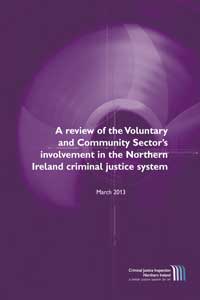
Report highlights contribution made by the voluntary and community sector to criminal justice
Criminal Justice Inspection Northern Ireland (CJI) has today (Thursday 28 March) published its review of the voluntary and community sector's (VCS) involvement in the criminal justice system.
The report tracks the progress and changes that have occurred in the seven years since the Inspectorate first examined the contribution of the VCS in this area.
"Inspectors are pleased to report that, while the context has changed significantly with devolution of justice and the recession, many of the positive features we observed in 2006 are still evident today," said Brendan McGuigan, Chief Inspector of Criminal Justice in Northern Ireland.
"In many instances there have been further improvements and in particular, the VCS continues to attract substantial monies into the criminal justice system from other sources to supplement local statutory funding.
"The VCS in Northern Ireland also remains flexible and innovative in its approach. With around 500 full-time employees or 1.8% of the VCS workforce directly engaged in community safety and criminal justice activity, it is making a substantial contribution to reduce reoffending, improving access to justice and supporting key elements of criminal justice reform through consultation and participation," said the Chief Inspector.
Current austerity measures have impacted on how VCS organisations operate.
"The Minister of Justice has limited budgetary cuts to 1.5%. This has helped minimise the impact of the current recession, but short-term and piecemeal funding, coupled with changes in the funding arrangements for VCS services remains an issue," said Mr McGuigan.
Inspectors have made four recommendations to improve the situation, including that responsible agencies should be identified from within the Department of Justice (DoJ) family to lead on specific funding relationships. They also recommended that criminal justice agencies should standardise their approach to funding.
Accountability arrangements had become more complex since 2006 and Inspectors found they could vary considerably depending upon who was allocating the funding.
The Chief Inspector continued: "Larger VCS organisations have adapted well to the extensive and varying levels of demands for feedback about their finances, practice and systems in place to deliver these. Inspectors however believe there is scope for a more proportionate response for lower risk organisations.
"We have therefore recommended that the DoJ and its statutory agencies which provide funding to the VCS should pilot a more risk-based approach to monitoring organisations’ practice and financial performance.
"By doing so there is an opportunity to minimise evaluation and compliance for its own sake and facilitate a reduction in bureaucracy and consequent savings within Government departments," concluded Mr McGuigan.